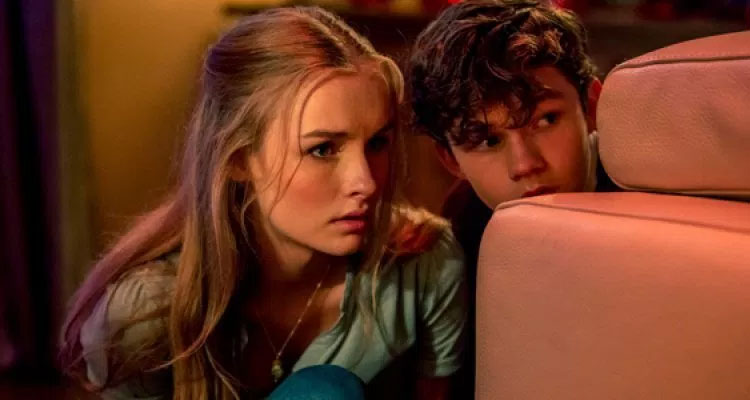Christmas Evil, by Reed Lackey
24 Dec
If you’re of the ever-growing variety of holiday movie-watcher who prefers sardonic wit and dark humor to sentiment and sap, or who prefers a bit of menace and violence to caroling or cookies, then top off the eggnog, because there’s a holiday treat in store.
Better Watch Out, a new film from director Chris Peckover (only his second feature), begins simply enough: responsible babysitter Ashley (Olivia DeJonge) is set to watch over 12-year-old Luke (Levi Miller) on Christmas Eve while his parents attend a party. This will be one of, if not THE last time, that Ashley will watch over Luke before she goes away to college and Luke wants things to be special. Unfortunately, the night is not long underway before it appears that someone may be trying to get into their home… if they aren’t already in.
To say more would be to spoil and deflate the surprising and macabre twists in this sharp little thriller, and it’s definitely a film worth knowing as little as possible about before viewing. Suffice it to say that things become darker and more brutal than you might expect from even a holiday horror film, and the film never pulls any punch to the face of traditional, saccharine, hallmark-variety Christmas fare. This is a film for cynics and grinches, and while there are moments of notable emotional resonance and even light touches of profundity, it is unashamedly an antidote to all things merry and bright.
The script is praise-worthy, not so much for its dialogue (which is frequently a bit clunky), but for its subtle narrative pivots. As the tension and danger mounts, we’re frequently left in the dark about whether or not the heroes or the villains have the upper hand, and there’s a clumsiness to each proceeding situation which keeps the humor sharp and the action believable. Everyone involved is in way over their heads, with no discernible hope of true victory, and the suspense of shifting advantages keeps the pace lively and engaging. Peckover displays deft instincts about precisely how much to show us and despite some overtly disturbing elements, the elements never feel gratuitous or exploitative.
The story also plays around quite a bit with the tropes we’ve seen before in the Home Alone films, and even in the larger John Hughes filmography. The film isn’t as interested in leaning on the nostalgic affection for these elements as it is in subverting them, taking the violence to a more realistic (and devastating) place while also pushing the boundaries of what an emerging sexuality in teens and pre-teens looks like. In this way, the film also dances thematically with the concept of male entitlement towards the object of their affection, and precisely how far such delusion can carry someone.
As a result, there are moments of complex emotional resonance, where characters we could easily dismiss in similar films as plastic plot devices suddenly reveal shades of vulnerability, sensitivity, and even compassion before they suffer a painful – and sometimes final – consequence. Things aren’t as simple as “the evil ex-boyfriend” or the “dumb jock” or the “stoner sidekick” in this film, though at first things appear to be going there. These are real people, characters with thought and feeling, who hope and understand and take risks and wish… and bleed. Apart from the two leads, we see only fractions of moments of the hidden life each character carries, but it’s enough to keep us from writing them off, which is a rare accomplishment in horror films.
This praise is as much to be heaped upon the performances as upon the script and direction. The only characters which truly feel cartoonish or disposable are Luke’s parents. They feel painfully like easy stereotypes in a film which is otherwise quite subversive towards such caricatures. But, again to Peckover’s credit, their presence is confined to the bookends of the film where they cannot hinder what has already been built. In a way, the things we learn about our characters along the way help to substantiate the view of two-dimensional representations of the parents as aloof and clueless, merely devices for either giving or receiving affection or material needs. And it is this perspective on the world, this minimizing of human intent and value, which drives so much of the villainy in the story. It deliberately contrasts with what we the audience see as the reality beneath the surface, making the tragedy more devastating, the irony more humorous, and the ending all the more satisfying.
Better Watch Out is not a sentimental film. In many ways, it’s a bold middle finger to the sugary sap saturating so much of traditional holiday entertainment. But it’s also a film which cannot be easily dismissed as mere cynicism. Unlike lesser holiday horror films, it seems to understand why its villains are villains. It intentionally contrasts their superficial, entitled perspective with characters we genuinely care about and then, in a delightful conclusion, literally gives a bold middle finger to that possessive and nihilistic mentality, just when it appears to have won.
If you’re looking for a fun, nasty little thriller this holiday season with narrative surprises, sharp wit, and just the right amount of thoughtful provocation, this is a film worth adding to your stocking this holiday.




No comments yet